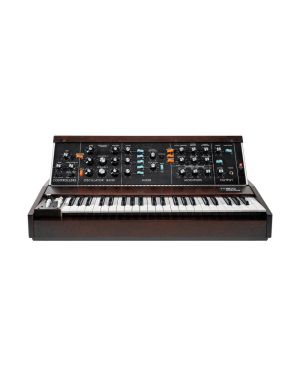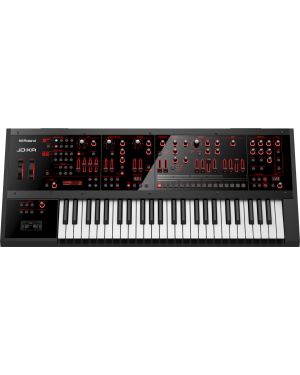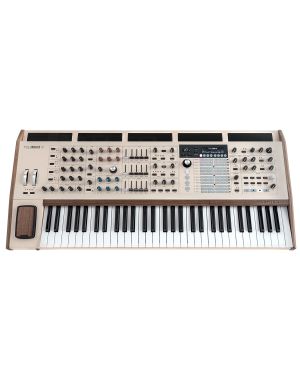
-
![Yamaha MODX8+ Music Synthesizer]() In Stock
In Stock -
![Roland JUPITER-X 61-Key Synthesizer]() In Stock
In Stock -
![Buchla Music Easel Retro Synthesizer]() In Stock
In Stock -
![Moog Minimoog Model D 2022 Re-Issue]() In Stock
In Stock -
![Roland FANTOM-06 Synthesizer Keyboard]() In Stock
In Stock -
![B-Stock Yamaha MODX8+ 88 Key Music Synthesizer]() In Stock
In Stock -
![Yamaha MODX6+ Music Synthesizer]() In Stock
In Stock -
![Korg Minilogue XD Polyphonic Analogue Synthesizer]() In Stock
In Stock -
![Expressive E Osmose Synthesizer]() In Stock
In Stock -
![Roland Fantom-8-EX Synthesizer Keyboard]() In Stock
In Stock -
Clearance
![B-Stock Roland JD-XA Hybrid Synthesizer]() In Stock
In Stock -
![Korg KingKorg Neo Analogue Synth]() In Stock
In Stock -
![Arturia Polybrute 12 Analogue Polysynth]() In Stock
In Stock -
B-Stock
![B-Stock Roland Fantom-6 Synthesizer Keyboard]() In Stock
In Stock -
New Release
![Korg MicroKorg 2 Synthesizer/Vocoder]() In Stock
In Stock -
![Buchla Music Easel 50th Anniversary Synthesizer]() In Stock
In Stock -
![Korg Wavestate MK2 Wave Sequencing Synthesizer]() In Stock
In Stock -
![Roland Fantom-6-EX Synthesizer Keyboard]() In Stock
In Stock -
Clearance
![Korg Wavestate SE Platinum Edition 61-Note Wave Sequencing Synthesizer]() In Stock
In Stock -
![Roland Aira Compact E-4 Voice Tweaker]() In Stock
In Stock -
![Oberheim OB-X8 Analog Synthesizer]() In Stock
In Stock -
![ASM Hydrasynth Deluxe Wave Morphing Synthesizer]() In Stock
In Stock -
![Roland AIRA Compact J-6 Chord Synth]() In Stock
In Stock -
![Yamaha Montage M7 76 Key Synthesizer]() In Stock
In Stock
THE ANALOGUE SYNTHS REVIVAL
The Synthesizer has been responsible for creating some of the most influential sounds ever heard in electronic music. From the inspiration of Pink Floyd, the opening riff of Gary Numan's hit song 'Cars' or the modern-day electronica of Daft Punk, synths have graced many influential moments in music history, and are now very much back in vogue - with a wide range of choices: from the well-loved Minilogue to recreation of old analogue classics such as the MS20 or ARP Odyssey, and the innovative new Roland synths such as the JD-XA.
WHAT'S THE DIFFERENCE BETWEEN SYNTHS & OTHER KEYBOARDS?
Home and Stage digital pianos are primarily designed for realistic sounds like traditional pianos, organs and strings.
Arrangers and Workstation keyboards often have similar onboard sounds to a synth, but also have integrated compositional, recording, sequencing, and sampling features.
MIDI keyboards produce no sound of their own but can be used to play virtual, software (or "soft") synths installed on your computer.
Synthesizers are about, above all, the art of "synthesis": playing around with different waveforms, oscillators and filters, to create your own custom, unique sounds. That's why since the seventies synthesizers have revolutionized keyboard-based music, and continue to appeal.
ANALOG VS. DIGITAL SYNTHS: WHICH IS BETTER?
The question of what's "better" is almost irrelevant, as they are different types of synthesis, and both can sound great. Digital can offer more versatility, but many players tend to like the warmth, "fatness" of analogue amps, which can also generate unpredictable results due to subtle changes of the voltage, temperature etc. Also, there's a certain "coolness" about vintage and modular synths, that appeals to many synth enthusiasts.
BUYING YOUR NEW SYNTH
Whether you're new to keyboards or an experienced performer, PMT's synthesizers and workstation keyboard selection range from basic handheld models such as the Korg Monotron right up to flagship technology like the Yamaha Motif XF8, and Roland Jupiter 80. We also stock drum machines, sequencers and groove boxes.
Visit your local PMT Store to talk to our experts and try a few synthesizers for yourself!
Synthesizer FAQs
-
What are the different types of synthesizers?
Synthesizers can be either analog or digital. They can also synthesize sounds in different ways, such as: subtractive, additive, FM, sample-based, vector, wavetable, spectral, granular, and physical-modelling.
-
Which synthesizers are best for beginners?
Some of the best beginner synthesizers are made by Arturia, Korg, Yamaha, and Roland; all which have a number of affordable and intuitive products for those starting out.
-
Do hardware analogue synths sound better?
Hardware synths sound different to digital synths. Some people prefer this sound, but it is hard to say whether one type is 'better' than the other.
-
What is the difference between monophonic and polyphonic synths?
Monophonic synths can only play one note at a time. Polyphonic synthesizers can play multiple notes at once - for example, if a synth has 8-note polyphony then it is capable of playing chords formed with up to 8 notes.























